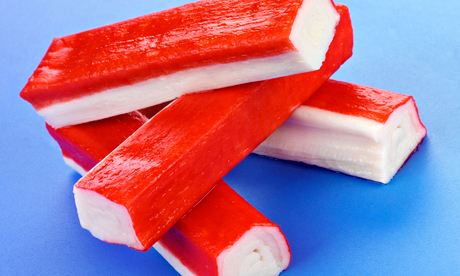
In the late 1980s, a new "delicatessen" opened near our house in Sheffield. Its name, though, was misleading. From its ceiling dangled no brightly coloured boxed panettones; on its counters there oozed no unpasteurised foreign cheeses. Its mainstays were bread cakes filled with roast pork and apple sauce (in Sheffield, we call rolls "bread cakes"), and freshly sliced corned beef and tongue. A particular favourite of ours was something known as crab salad, to be taken home in a little polystyrene pot. A combination of egg mayonnaise and crab stick, it was good in sandwiches. Some days you felt like corned beef, and some days you felt like crab salad, and that was how we rolled in the long summer holidays.
I suddenly remembered this crab salad as I read the story of Steve Allen, who ordered crab bruschetta in the Swansea branch of the "New York Italian" restaurant chain Frankie & Benny's only to find that it had been made partly with crab stick, AKA surimi, which – as you doubtless know – is an emulsion made from the pulverised meat of cheap white fish bound together with additives and salt to give it the pinkish appearance and taste of real crab. Allen was distinctly unimpressed, particularly when his waiter assured him the dish was 100% crab. So he complained to Frankie & Benny's owner, The Restaurant Group (turnover last year: £580m), and duly received a letter admitting the dish did indeed contain crab stick. He then wrote back, suggesting that failing to mention this was an offence under food regulations. The Restaurant Group, however, stood firm, insisting it had "taken advice" on this. Only when Swansea council trading standards and the press became involved did the chain finally withdraw the "crab bruschetta" from its menus.
My response was, shall we say, multiphased. At first I felt righteous indignation. How disgraceful to present fake crab as real! But this passed amazingly quickly. For one thing, there is a certain amount of comedy in getting furious with a chain such as Frankie & Benny's. Once you get started, you could go on for ever. When I worked as a waitress in a grim "family" pub, I was always baffled by customers who ordered the £3.99 lasagne and chips, only to complain it was tasteless. What did they imagine? That "chef" had been up since dawn infusing the milk for the bechamel with bay leaves and cloves? Hadn't they noticed the catering-size cans of "Italian-style" this and "authentic-style" that beyond the car park? If I hadn't been so desperate to keep the job, I might have taken them on a quick backstage tour.
I also surprised myself by wanting to leap to the defence of crab sticks (or "seafood" sticks, as they must now be known). On the internet, you can watch a film of surimi being made. It isn't pretty. I expect its production is an ecological and moral minefield for someone like me, who worries about over-fishing and the effect cheap food is having on our bodies and the planet. But on the other hand, "natural" is a word that we would do well to treat with suspicion (lots of good things are not remotely natural, and plenty that are – cancer, for instance – are monstrous). Cooking, moreover, has always involved sleight of hand, an element of masquerade. Consider the foie gras pâté that poses as a mandarin orange (see Heston Blumenthal's Dinner), or the egg "yolk" that is made of cod and saffron (Simon Rogan).
When I was researching my book about the 1950s, I spent some time looking at the austerity manuals that were designed to help housewives battling the strictures of rationing. The recipe that has stuck in my mind – I still think of it every time I make a cooked breakfast – is for "eggs" that were really tinned apricots fried in bacon fat. But there were plenty of others: a "summer" pudding made of rhubarb and prunes; a "trifle" concocted from stale tea buns, fruit juice and a pale gloop comprising potato flour and vanilla flavouring; a "mayonnaise" whose main ingredient was custard powder; a "honey" that was the result of boiling sugar and parsley. Not all of them sounded wholly disgusting – it's amazing what delights, in extremis, you can produce using margarine and sultanas – and morally speaking, they were unimpeachable: healthy, modest and an important contribution to the war effort. Would I eat crab sticks now? Perhaps not, though I see (quick Google) that they are available for delivery by my (quite posh) supermarket of choice. And now I think about it, I really wouldn't mind having a go at making that pale creamy crab salad we used to like so much … Not much of a madeleine, I agree. But for me, at least, a pretty efficient form of time travel.

